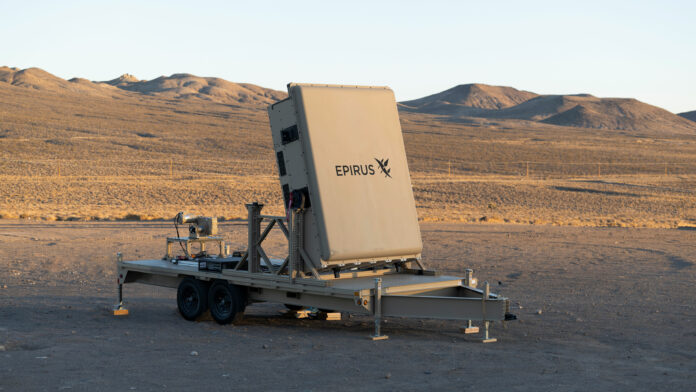Torrance-based Epirus Inc., which makes a microwave technology-based system to take out drones, announced Feb. 15 that it had raised $200 million in Series C funding, money that it intends to use to expand and to explore commercial power management applications for its technology.
The financing round was led by funds advised by Baltimore, Md.-based T. Rowe Price Associates Inc., with support from original investor 8VC of Austin, Texas. A dozen other investors participated, including Miami-based I Squared Capital and New York City-based Moore Strategic Ventures.
Epirus was founded in 2018 to capitalize on the fast-growing market of anti-drone weaponry. It has developed microwave-based technology that directs intense energy in electromagnetic pulses at small targets, especially drones that pose security threats.
The company has grown rapidly from a handful of employees in a 4,000-square foot facility in El Segundo three years ago to roughly 200 employees today. About 150 of those employees work at the company’s 100,000-square-foot headquarters in Torrance that it moved into in November.
As part of this financing round, the company said it received a valuation estimate of $1.35 billion.
“This new round of funding and associated valuation are clear signals of the increased demand for our directed energy systems and the limitless application areas for our SmartPower technology,” Epirus Chief Executive Leigh Madden said in the funding announcement.
Epirus is one of hundreds of companies racing to build anti-drone weaponry to meet rapidly rising demand to protect against the proliferation of drones that pose security threats.
For fiscal year 2022, the Department of Defense budgeted $636 million for the development of counter-drone technologies and $75 million for the deployment of counter-drone weapons systems, according to a June briefing paper from the Congressional Research Service.
On the civilian side, demand for counter-drone technologies have been driven by increasing reports of drones interfering with aircraft and straying into unauthorized areas near critical infrastructure facilities or sports and entertainment venues.
With this intense demand, Rockville, Md.-based MarketResearch.com in a December report projected the counter-drone market to grow to $6.4 billion in 2031 from $1.6 billion last year.
Scores of companies have rushed into the market, from big defense contractors such as Reston, Va.-based General Dynamics Corp. and Bethesda, Md.-based Lockheed Martin Corp. to established anti-drone players such as San Francisco-based Dedrone Holdings Inc. and more recent startups such as Epirus.
But each company has come to the market with its own technology, and no single technology platform has yet emerged as a preferred alternative. Epirus is gambling that its microwave technology anti-drone platform, called Leonidas, will emerge as a leading option. To bolster its position, in October the company announced it had reached an agreement to partner with General Dynamics Land Systems to have its Leonides system mounted on General Dynamics’ Stryker combat vehicles.
Meanwhile, on the non-weapons side, Epirus plans to use some of its Series C funding to refine its directed energy and power calibration technology platform to integrate it into a range of electronic systems with the goal of conserving energy and lengthening battery life. To help in that effort, Epirus is currently participating along with three other companies in an Army Applications Laboratory program focused on developing efficient power generation and storage technologies.

